
My mother, Etta Freilich Wandrei
Recorded December 22, 1980
Universal City, Texas

My mother, Etta Freilich Wandrei
Vishni Bystra was in the lower Carpathian Mountains of what was then Czechoslovakia. It wasn't a big town. We had only about 1000 people altogether. The largest majority was of Christians but there were a good number of Jews. Most of the Christians were "hillbillies," that is, farmers, sharecroppers, who worked for the Jews. Very few had their own businesses. The Jews were better off. A few were very rich landlords but most were middle-class and a very few were very poor.

House of the Hoifmans, a wealthy family
We had no electricity and used kerosene instead. The streets were paved except for the ones that went into the hills. We had no cars. We used a horse and buggy to go between towns. We did our shopping and went to the doctor in Volevec. One family owned a horse and buggy and if you wanted to, they went early in the morning and came back late in the afternoon. Once a day a bus came through that went through all the villages to the big city to catch a train. It took four hours to get to the big city, Chust, the biggest city our area. It was big deal when the bus came back and we'd come to see who would come on the bus.
In the summer we had a lot of tourists because we were a summer resort. We
had mineral baths in the mountains. People came for their vacations. It was a
big deal for us because people came from different cities and even different
parts of the world. We had no hotel. They'd stay in rented rooms. Some would
stay up in the mountains in cabins where the baths were. We'd climb the trees.
It was very beautiful. 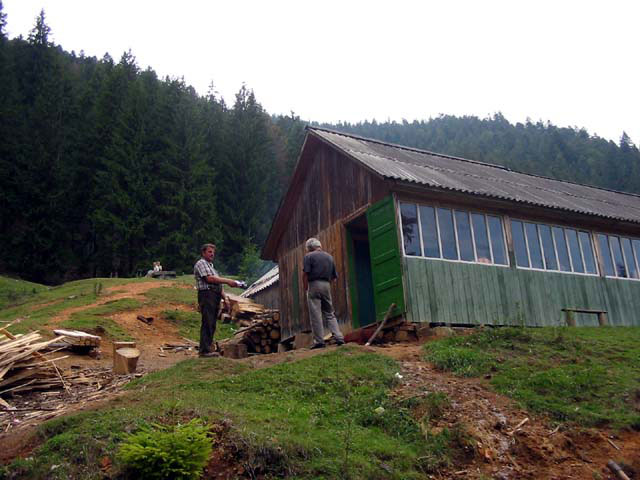
At home we spoke Yiddish, went to a Czech school, but also knew some Hungarian, Ukrainian, and Russian. Slavic languages have a lot in common. Non-Jews spoke Ukrainian or Russian. We grew up with them so we knew their language but very few knew Yiddish. All of us grew up with 3 languages.
There was a nice living arrangement between the Jewish and the non-Jewish (Russian Orthodox). There was nice communication.
We tried to honor and observe each other's beliefs. On Jewish holidays they wouldn't do anything to offend us, just work in the fields. No businesses were open, no laundry was hung out. We did the same on Christian holidays. Up until the beginning of the war, it was as nice friendly community with no discrimination. That was typical in that part, in those small towns. You depended upon each other. The Christians had to work for the Jews, and the Jews depended upon the Christians. We were not assimilated. I don't know how it was in the big cities in Czechoslovakia.
My family was very religious. 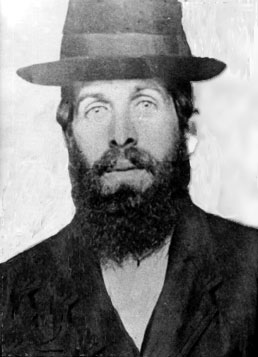 We were Hasidic. My father was very religious.
He was a Torah teacher, teaching young boys to become rabbis. He taught in
yeshiva. He wasn't a rabbi but when our rabbi went away he was the substitute.
He was a Talmudic scholar. He studied his books all the time. When I got to
Israel I ran into people who were his students. His name was Smuel.
We were Hasidic. My father was very religious.
He was a Torah teacher, teaching young boys to become rabbis. He taught in
yeshiva. He wasn't a rabbi but when our rabbi went away he was the substitute.
He was a Talmudic scholar. He studied his books all the time. When I got to
Israel I ran into people who were his students. His name was Smuel.
I dressed in modern clothes. The religious women wore modern styles. My father dressed religious, with pyes, yarmulke, a special fur hat, and tallit. He went to synagogue early every morning.
My Grandfather, Smuel Fixler, in the 1930's
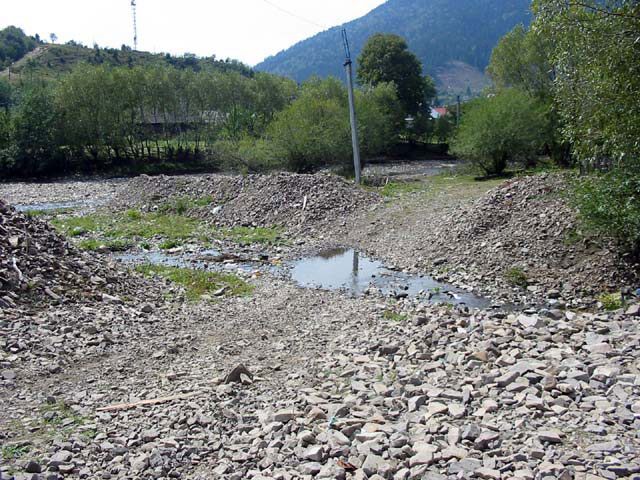
Site of the synagogue and the Czech school. During the Holocaust this is where the Jews were rounded up.
We kept a kosher house. Everyone did. The boys went to temple every day. The girls didn't go until they were 13 and only on the high holidays, such as Yom Kippur. Before I was 13 I had a lot of fun on the high holidays. Because the parents were in synagogue all day and we had Christian babysitters, we did all kinds of mischievous things. We had the run of the house. Everybody had maids.
Site of the House Where My Mother Grew Up
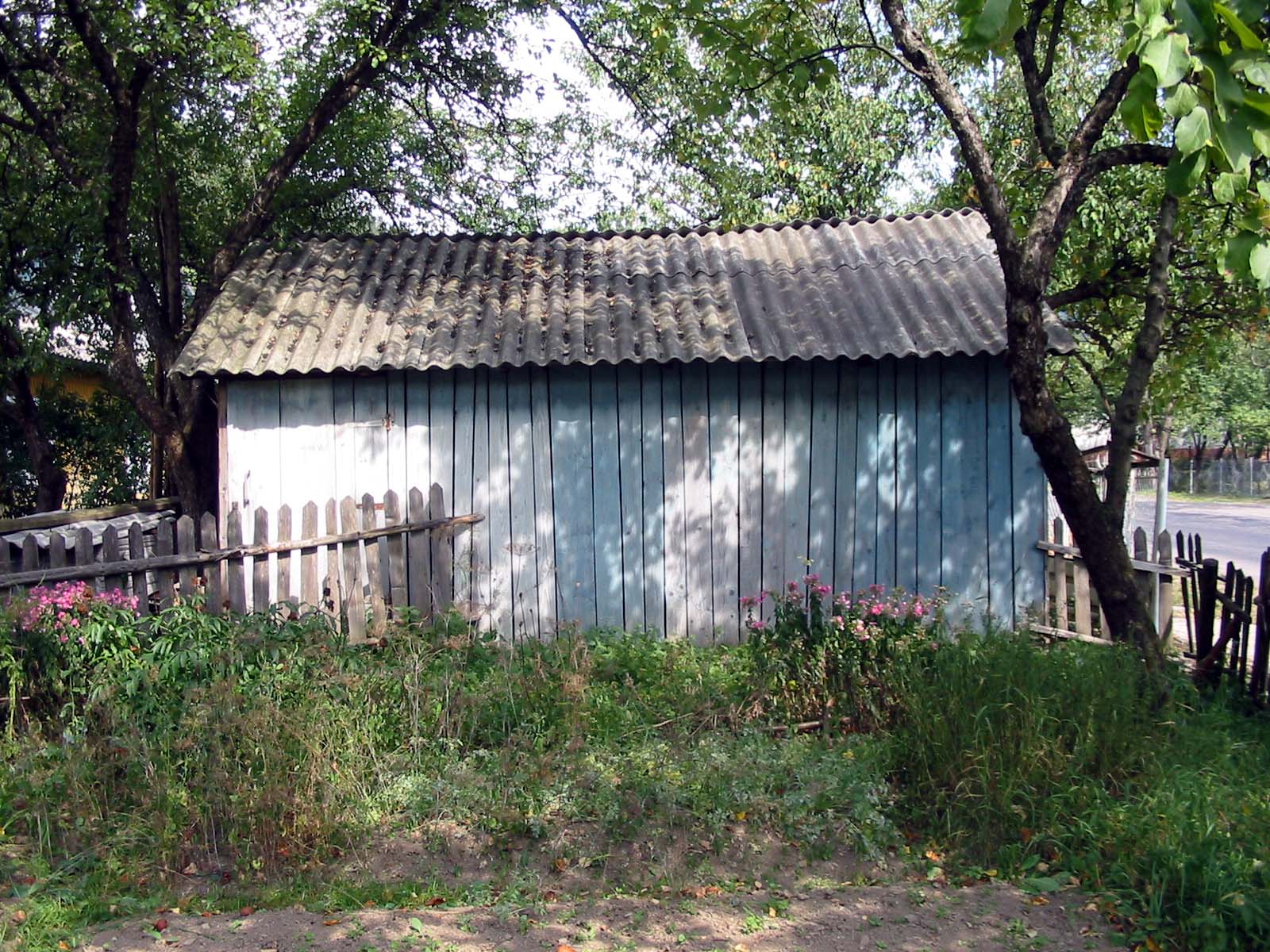
I didn't travel when I was a child. Up until my teens there was no talk of the war. I didn't read the papers. Very few people read the papers. My Uncle Bernard always got the Hungarian paper. I remember vaguely when radios came in. There was a time before radios. Somehow people knew what was going on. People would come and go and bring news.
I read a lot. I ordered books from the city even when I was a pre-teen. I learned a lot from my teachers. There was a regular elementary school and high school but I never finished high school because of the war and I left when I was 17. I went to school up to age 16. There was no school between 16 and 17 because Czechoslovakia left and Hungary hadn't taken over yet. It wasn't like high school in this country. You didn't have to go. Everybody had to go up to junior high. You didn't have to go unless you and your parents wanted you to. Most girls and boys didn't go if they needed to work in the fields. It was a one-room high school. All the grades were taught together by different teachers. We had two teachers. It wasn't as advanced. If you wanted to, you could go to the city (lots of people did but not from my town). Lots of my cousins went to high school in the city. It up was up to yourself how much education you wanted. You could have a private tutor. I had one for German. When the war broke out I left and I didn't resume my education until I went to Israel.
I'm sure I wouldn't have gone to college even if it were not for the war. The teachers picked kids for scholarships to go to high school in the city (there were 3 openings. Very few boys went to high school because they went to religious school. There were two girls in my class who qualified, me and my friend Rachel, but my grandmother wouldn't let me go. Because I couldn't go the other mother wouldn't let Rachel go.
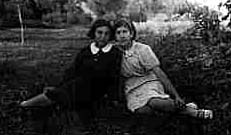
My mother and her cousin Rachel Newman, who died in the Holocaust
I always knew I was going to leave. I had a terrible hard life with my grandmother. I can look back now and see she has given me a lot of values in my life. I needed to get away. I tried a couple of times but I didn't succeed until she let me. She took me in and provided for me but never showed that she loved me. She always knocked me down. I wasn't like her other grandchildren who were pretty. I wasn't pretty. Her other grandchildren were pretty.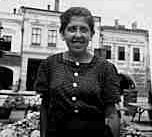
People knew about Zionism but were so religious that they were against it. They believed the only way to go to Israel was through the Messiah. I used to go to Torun. That was a Zionist town of that district. I joined the party there when I was about fifteen. My grandmother didn't know. I had an uncle who lived there. It was maybe 3 miles to Torun. I'd say I was going to visit my uncle and instead went to meetings. She found out when we tried to organize a Zionist group in my own town. I was active and it was disgraceful. When they found out about me they called the rabbi and I threw out the rabbi and I got slapped by my grandmother for it. I joined the party and I knew it was a matter of time before I would be leaving. It was none of her business and I didn't pay any attention.
The borders were open - Poland, Rumania. It wasn't hard to go over. You could easily go. When I was in elementary school we'd walk to the borders and meet the Polish kids and camp. We had a horse pulled trolley you could be pulled if you got tired. That was our summer thing before school let out. They had border guards. We could talk with each other, in Polish and Czech and Yiddish. We looked forward to this when school let out.
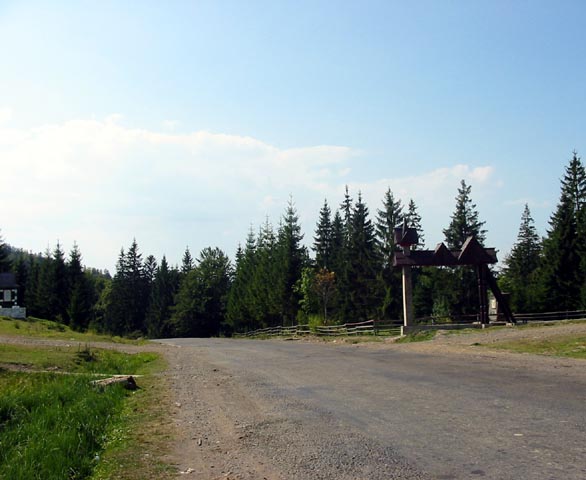
The old border with Poland. During the Holocaust some of the older people from Vishni Bystra were murdered at this site.
My mother died when I was about 1 1/2 years old. I had another older sister, older than Pnina. She died too. She was 17 when she died. My mother died right during childbirth. She had a baby boy and the baby died too. I don't remember my mother. There was never a picture of her. Those days people didn't take pictures. It was not uncommon to die in childbirth. There were no doctors. One woman every baby she had was by C-section. She kept having them. There was no birth control. All children were delivered by women who knew how to do this. Quite a few died. A woman got married. A woman was a slave. She had nothing to say if she didn't want to marry the guy. Her parents made her. Marriages were arranged.
I was 8 when my father died. I remember him. He died of TB. And my older sister died of TB. There was a lot of TB in my family. There was a lot of TB in that district because of poverty. You couldn't avoid it. My sister caught it in school. My father got it from her. They didn't know how to take care. There were no sanitariums. Health care was bad. I was very thin, a bad eater. I always looked sickish. I found out later that I had TB but overcame it but had built up the antibodies in my body. I must have been pretty strong to overcome it. I remember my father being very sick. My father did go to a hospital. I was already living with grandma when he got sick. That's when she took me away. He was away a long time. He came home from the hospital. He brought me a pair of white shoes. I must have been about pre-school when that happened.
I remember little about him. When I was living with him before my stepmother had children and my grandmother took me away, one time it was a very cold winter. I must have cried I was cold and he came and picked me up and took me to bed with him and enveloped me and tried to heat me with his own body. He loved me a lot. He had bad fights with grandmother. One day before he died he came to grandmother and she wouldn't let him in. He wanted me back. I was asleep and he broke the window and my grandmother hit him. He gave up and was very sick. I remember when he died I didn't cry. I don't know why. I didn't associate with him anymore as a father. He'd be in and out of the hospital. It didn't affect me until later. I started missing him terribly. I remember small little incidents when I had conjunctivitis. I remember once when I hit my head when I was running behind a fruit wagon and fell. I don't remember the pain but I remember him picking me up and cradling me. The few things I remember were po sitive. He never hit me; he never punished me, but held me in his arms. Those were the last hugs I had.
My grandmother instigated me leaving home. I would have left even if there had been no war. If my childhood would have been better I wouldn't have left. I wouldn't have been married with the arranged marriage. Because of that I knew I had to get away. Several times I threatened to run away. My grandmother was trying to be nice. I was trying for an education. She wouldn't let me buy certain books; I had no money of my own. I would say that I couldn't live like this.
The school library wasn't very big. I was a good student. I wanted to read everything. I don't know what motivated me. Most kids didn't like school but I did. I was always trying to learn. I didn't go out to play when I came home from school until I did my homework but this wasn't because grandmother made me. I always felt like it wasn't good enough but I'd get an A anyway. I was always picked in parents meetings to talk. We'd put on shows for the parents and I was in the school play and the choir. On the principal's birthday the teacher wanted two students to make a speech and I was chosen as one of the best students to write a speech. It was in the spring. We had to get fresh flowers for him. Dahlias grow early in the spring. We went to this village woman to get red dahlias. We paid for it. I was a good student. I always wanted to learn. I would have gone to college if I could have. I probably would have gotten an education despite grandmother if it hadn't been for the war. The teachers knew my home situation. They lived across the street. I had a lot of moral support form my teacher. He told me to bide my time, someday I'd go to college.
When I was 15 or 16 I had boyfriends. We'd smooch; do things we weren't supposed to do. I wasn't supposed to go anyplace unless grandmother sent me. In summer we'd walked up and the down the street. When it got dark we were supposed to be in the house. Later when I started going with boys she'd light a candle (there were no lights) and go through the streets and call. There was only one girl who got pregnant. She was from a very rich family. Nobody believed her that she was fooling around with a teacher. She was about 18 and very beautiful. We fooled around - no sex but kissing. Grandmother was afraid. She'd embarrass me. Nobody else did this to their children. I'd hide. I'd be punished when I came in. I made up stories I was there. It was terribly embarrassing. The guy she had picked for, well, he was my boyfriend. She accepted it. His name was Herman and he came from a better family. He was two years older. Herman went away to school in the city. She looked up to him because he was educated. He was always at our house in the evenings when he came home. We'd sit and talk. If she needed errands she'd tell me to ask Herman to go with me. Herman's now in Israel.
Our big mischief was to steal corn and break fences. Everyone had fruit tress. There was a widower who was awful ugly to us kids. He had cherry trees. They were his babies. He never gave any to the kids. He also grew raspberries. Lots of people had raspberries. He was the town butcher. We'd go and break off the branches of the cherry tree. We never told who did it. Most of the parents didn't punish us. They knew we had to do something. One night we'd do it to one family, one night the next one. The butcher would go to the families and they'd say they'd punish the kids but then they ignored him.
On Saturday after synagogue we'd have a meal, grandmother would read the Bible, and we'd nap. At 9 or 10 we'd have a party, with cookies and candies. We'd go in somebody's barn and clean out a barn on Friday afternoon. We'd make dollhouses out of boxes. Our dolls were home-made raggedy dolls. We'd play until it was time to go home to eat dinner.
Later when I was bigger we realized we didn't want kosher stuff. The non-Jewish stores had salami. Rachael and I and a few others would send Sophie our maid and she'd swear she wouldn't tell. We'd pay her. We weren't supposed to handle money on Saturday. I stole from grandmother when she was asleep. Sophie would bring the salami and we'd hide and eat it. Once we went on a school outing and it was getting dark and we passed the store with the salami. Our teacher noticed and he let us get away with it.
We'd go out with boys and go into somebody's house. Rachael's mother didn't have such a good name. Her husband went to the US and left her with four children and later took the older daughter but she couldn't stand it and came back home. He was somehow related to us. Her brother married my aunt. Rachael and I were the same age and friends. One time Rachel's father came home from the US. He committed suicide and left his wife without anything so she opened a tavern, a beer hall (see a picture of a tavern from Vishni Bystra) . She would sell beer. Rachael's older sister was very beautiful. She'd fool around with guys. People drank a lot of beer during those days. So she had a bad name. It never bothered my grandmother that I played with Rachael because she understood that Rachel's mother had to support herself. Later on she had a record player. She had a room so our folks wouldn't know where we were. We'd dance boys and girls. Sometimes they'd find out and parents would slap their kids and wouldn't let their kids associate with her.
Everyone went to a wedding in the town. Parents were at the wedding and the teens went to her house. At the wedding you couldn't dance. You didn't get missed. The whole block was involved in the wedding. Mrs. Becovich (Rachel's mother) would get it from the parents if they found out. She'd protected us. That doesn't sound like much now but in those days it was a big thing to do.When the Zionist guys came that was a huge problem for parents. People really despised you. They tried everything to not let you belong but you did. We always tried to have it in the religious way. We'd have the meetings on Friday night and say prayers so the parents would let us. We'd sing Hebrew songs and dance Hebrew dances. It was like a youth center to get together, boys and girls. They didn't like boys and girls to get together, but it was ok if they sneaked away. It was all right as long as you didn't do it in public.
Copyright © 2003 Karin Wandrei